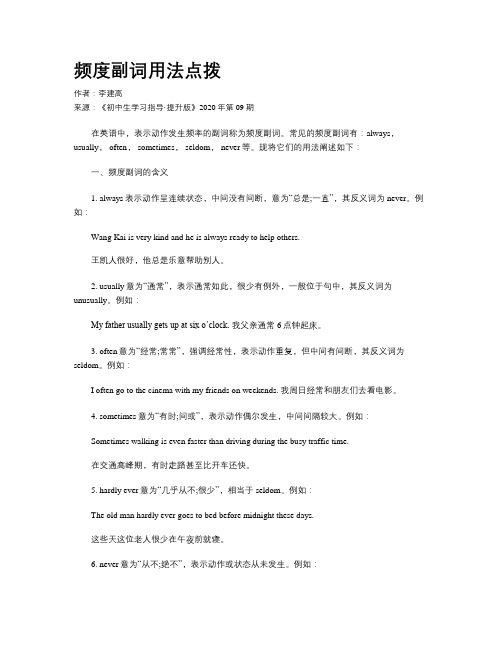5频度副词)
周练周总结:频度副词

高效上好每节课·快乐上好每天学
【典例1】(四川宜宾)
—______ do you go to movies?
高效上好每节课·快乐上好每天学
【典例3】 (2014 甘肃嘉峪关期中)
Yeah, my son is kind of unhealthy because he _____ exercise.
A. usually
B. hardly ever
C. always
D. sometimes
句意:是的,我的儿子有点不健康是因为他几乎不锻炼。usually“通 常”;hardly ever“几乎不”;always“一直”;sometimes“有时 候”。故选B。
高效上好每节课·快乐上好每天学
【 see her in the supermarket.
A. sometime
B. some time
C. sometimes D. some times
sometime表示“某个时候”;sometimes表示“有时候”;some time表 示“一段时间”;some times表示“几次”。根据句意可知此题需要的 是频度副词sometimes。故选C。
易错点2
sometimes与some times/some time/sometime的用法区别
sometimes
“有时;不时”,意思与at times相近,多用于一般 现在时。
some times
“几次;几倍”,其中time为“次;倍”,是可数 名词。
五年级-频度副词-修正版PPT课件

} 一次:once 两次:twice
day month
≥3次:基数词+times
+ 日、周、月、年... week year
完整版课件
9
Translate the phrases below:
完整版课件
10
Translate the phrases below:
once a day once a month
19
此课件下载可自行编辑修改,供参考! 感谢您的支持,我们努力做得更好!
完整版课件
5
Translate the sentences below:
我很少去购物。
我总是上课迟到。
我经常参加学校乐队的练习。
我有时候喜欢弹钢琴。
我从不打乒乓球。
完整版课件
6
Translate the sentences below:
我很少去市场。
I seldom go to the market.
four times a montwh ash my clothes
完整版课件
14
Jerry
一天三次 three times a day
每年两次 twice a year
每周一次 go to the cinema
once a week
完整版课件
15
对划线部分提问: I play football once a week.
ride a bike 完整版课件 play the piano 17
summary
频度副词(短语): 这类词用来表示某一动作发 生的频率,或某一状态出现 的频率,即在一定的时间内 动作重复发生或状态重复出 现的次数。
含义
频度副词那些事儿

一 S o m etim es.有时。
" 努 力 地 ”,而hardly相 当 于 一 个 否 定 词 ,它本身含有否
② — How often does Chen Hua watch T V ? 陈华
定 意义,不应当再加否定词。例 如 W
一
① He works hard.他努力工作。
Three times a week. 一
从来不迟到。
three times等 表 示 具 体 次 数 的 词 或 短 语 ,此时与how
二、 频度副词在句子的“位置#
o fte n区 别 不 太 明 显 。对 具 体 次 数 进 行 提 问 时 ,两者均可
大观
语法沙龙
苑
CRAZY ENGLISH
江西邱世才
◎用法梳理 often、always、usually、sometimes、seldom、hardly 、never等 词 是 频 度 副 词 的 主 要 成 员 ,表 示 某 一 动 作 或 某一情况在单位时间内发生的次数。对这类副词的考 查 ,已成为中考的主要考点。 一 、频 度 副 词 表 示 的 “频 率 # always(总 是 ;一 直 )"usually( 通 常 )>often( 常 常 )> sometimes( 有 时 )>seldom( 很 少 )>hardly ( 几 乎 不 ;简 直 不 )"never( 从 不 ) 上面是频度副词表示动作发生频率的大小排序。具 体来说: 1. always意 为 “ 总 是 ;一直 ”,在频度副词家庭中可 是频率最大或最高的词,相 当 于 100%,表 示 动 作 重 复 , 状态继续,中间从来没有间断,没有例外。例 如 : The sun always rises in the east and sets in the w est.太阳总是东边升起西边落下。 【知 识 拓 展 】 always与all the time都 有 " 总 是 ;一直” 的意思。al ways是一般现在时态的 ‘‘信息标志 词 ”,always 与现在 进 行时态结合,表示经常性或反复性的动作,表示说话 人的某种感情,如赞扬、批评、厌烦等。all the time是固 定 短 语 ,表示某个特定阶段的开始一直到结束,不表示 频 度 ,通常放在句末。例 如 : ① He is always helping u s .他总是帮助我们。(表 示) # You are always giving me trouble, f尔总是给我 添麻烦。(表 示厌烦) $ The students listened to the teacher carefully all the tim e .学生们一直认真听老师讲课。 2. usually意 为 “ 通 常 ”,频率仅次于always,相当于
频率副词类的英语单词

频率副词类的英语单词1. Always(总是)2. Never(从不)3. Often(经常)4. Rarely(很少)5. Sometimes(有时候)6. Frequently(频繁地)7. Regularly(定期地)8. Occasionally(偶尔)9. Seldom(很少)10. Generally(通常)11. Daily(每日)12. Weekly(每周)13. Monthly(每月)14. Yearly(每年)15. Hourly(每小时)频率副词类的英语单词,来300个1. Always(总是)2. Never(从不)3. Often(经常)4. Rarely(很少)5. Sometimes(有时候)6. Frequently(频繁地)7. Regularly(定期地)8. Occasionally(偶尔)9. Seldom(很少)10. Generally(通常)11. Daily(每日)12. Weekly(每周)13. Monthly(每月)14. Yearly(每年)15. Hourly(每小时)16. Annually(每年一次)17. Continuously(不断地)18. Usually(通常)19. Infrequently(不经常地)20. Occasionally(偶尔)21. Consistently(一贯地)22. Once(一次)23. Twice(两次)24. Three times(三次)25. Rarely(很少)26. Hardly ever(几乎从不)27. Every other week(每两周一次)28. Every three months(每三个月一次)29. Every day(每天)30. Every night(每晚)31. Every week(每周)32. Every month(每月)33. Every year(每年)34. Every few days(每隔几天)35. Every other day(每隔一天)36. Every other month(每隔一月)37. Every Tuesday(每周二)38. Every Thursday(每周四)39. Every Saturday(每周六)40. Every other Saturday(每隔一个星期六)41. On weekdays(工作日)42. On weekends(周末)43. Once in a while(偶尔)44. At times(有时候)45. From time to time(偶尔)46. Off and on(断断续续)47. Sporadically(零星地)48. Infrequently(不经常)49. Once or twice a week(一周一两次)50. A few times a year(一年几次)51. Very often(非常经常)52. Uncommonly(不常见)53. Seldomly(很少)54. Never again(再也不)55. Sometimes soon(很快有时)56. Not very often(不常)57. Just once(仅仅一次)58. At hourly intervals(每小时一次)59. Semiannually(半年一次)60. Semiweekly(每周两次)61. Quarter-hourly(每15分钟一次)62. Biennially(两年一次)63. In too large a percentage of cases(在太多的情况下)64. In many cases(在许多情况下)65. Infrequently(不经常)66. In rare cases(在极少数情况下)67. Infrequently(不经常)68. Intermittingly(断断续续)69. Irregularly(不规律地)70. More often than not(多半时候)71. Morning, noon and night(日日夜夜)72. Nightly(每晚)73. Now and then(偶尔)74. Occasionally(偶尔)75. Often enough(经常的)76. Quarter-hourly(每15分钟一次)77. Regular as clockwork(准时正点)78. Regularly timed(定时的)79. Repeatedly(反复地)80. Spasmodic(间歇性地)81. Sporadically(零星地)82. Sometimes(有时候)83. Sometimes sooner, sometimes later(有时更早,有时更迟)84. Sometimes this year(今年有时)85. Sporadically(不定期地)86. Three times a week(每周三次)87. Twice weekly(每周两次)88. Uncertainly(不确定地)89. Unevenly(不平均地)90. Unfrequently(不频繁地)91. Uninterruptedly(不断地)92. Usually, but not always(通常,但不总是)93. Very frequently(非常频繁)94. Weekly(每周)95. Yearly(每年)96. Intermittently(间歇地)97. The whole time(始终)98. The whole year round(全年)99. Less often than not(很少)100. Always and forever(永远)101. Hardly ever(几乎不)102. Annual(每年)103. Constantly(经常)104. Have to(必须,经常)105. Continuously(持续地)106. Every day but Sunday(除了星期天)107. Every night except Monday and Wednesday(除了星期一和三)108. Every other day(每隔一天)109. Every other week(每隔一周)110. Every other month(每隔一个月)111. Every other year(每隔一年)112. Invariably(无论何时都)113. Once a day(每天一次)114. Quite often(相当经常)115. Sporadically(有时)116. Weekly(每周)117. Frequently(时常)118. Intermittently(间歇地)119. Monthly(每月)120. Annually(每年一次)121. Never again(从不再来)122. Often enough(够经常)123. Hourly(每小时)124. Daily but Sunday(除星期天之外的每天)125. Every night but Thursday(除周四之外的每个晚上)126. Every other day(每隔一天)127. Every other week(每隔一周)128. Eevery other month(每隔一个月)129. Every other year(每隔一年)130. Hardly ever(几乎从不)131. Frequently but not always(经常但不总是)132. As much as possible(尽量)133. By and large(总的来说)134. Constantly(不断地)135. Daily(每天)136. Day by day(一天一天)137. Early and often(早早地经常地)138. Every blue moon(不经常)139. Every once in a while(偶尔)140. Every so often(有时)141. From time to time(时常)142. Habitually(习惯地)143. Infrequently(不经常)144. Irregularly(不规律地)145. Moment to moment(一刻不停)146. Most of the time(大部分时间)147. Nightly(夜间每天)148. Now and again(时时有)149. Now and then(有时候)150. Often (times)(经常)151. Occasionally(有时候)152. Once (a day, a week, an hour)(一次(每天,每周,每小时))153. Once in a blue moon(几乎不)154. Once or twice(一两次)155. Onetime(一次性的)156. Periodically(周期性地)157. Rarely ever(几乎从不)158. Regularly scheduled(定期的)159. Repeatedly(反复)160. Routinely(通常)161. Seldom(很少)162. Semi-frequently(有时)163. Sometimes(有时)164. Sometimes sooner, sometimes later(有时早有时晚)165. Sometimes this year(有时这一年)166. Sporadically(偶尔)167. Twice daily(每天两次)168. Twice a week(每周两次)169. Typically(一般来讲)170. Uncommonly(不常见)。
常见频度副词频率大小

常见频度副词频率大小常见频度副词按频率大小排列如下:always100%>usually80%>often60%>sometimes40%>seldom20%>hardly 5%>rarely never0%位置◆频度副词在句中习惯上位于系动词、、情态动词之后,之前;1. 在系动词之后;如:She is sometimes very busy. 她有时很忙;2. 在第一个助动词或情态动词之后;如:I will never forget this lesson. 我将永远忘不了这一课;3. 在之前;如:We often go there. 我们常去那儿;◆sometimes也可放在句首、句中或句末,often也可放在句末一般不放在句首;如:Sometimes she writes to me. =She writes to me sometimes. 她有时候给我写信;She writes to me often. 她经常给我写信;◆如果有两个,频度副词通常放在第一个助动词后面;如:We have never been invited to one of their parties. 他们聚会,一次也没邀请过我们;She must sometimes have wanted to run away. 她有时候一定想到过要逃走;用法◆always 频率最高,表示动作重复、状态继续,表示"一直、总是",其反义词为never;always 等与not连用时,表示部分否定;如:The rich are not always happy. 有钱的人并不总是快乐的;如果要变为,应将always改为never才能全部否定;如:Li Ping is always late for school. 李平上学总是迟到;Li Ping is never late for school.全部否定Li Ping is not always late for school. 部分否定频度副词通常和连用,表示动作发生的频率;但always与进行时连用时,并不强调动作正在进行,而是表示赞叹、厌烦等情绪;如:He is always thinking of others. 他总是想着别人;赞叹She is always asking silly questions. 她总是问些愚蠢的问题;厌烦◆usually意为"通常",表示习惯性动作或状态,很少有例外;如:We usually go to school at seven in the morning. 我们通常在早上七点上学;My mother and I usually go shopping on Sundays. 我和妈妈通常在星期天去买东西;◆Often意为"经常,时常",表示反复性的动作或状态,中间有间断,不如usually那么频繁;其反义词是seldom;often在句尾时常被very或quite修饰;如:It often rains here in April. 这儿四月份常下雨;The boys often eat noodles and the girls sometimes eat them. 男生经常吃面条,女生有时吃;I often chat with my friends under the big tree. 我经常在这棵大树下和朋友聊天;He writes to his friends quite often. 他常给他的朋友写信;◆sometimes意为"有时",频率不及often,表示动作偶尔发生,间断时间较长;其位置比较灵活,放在句首、句中、句末都可;如:Sometimes we go to the cinema and at other times we go for a walk.有时我们去看电影,有时我们去散步;I sometimes watch TV in the evening. 我有时晚上看电视;My father has lunch in the factory sometimes. 我父亲有时在工厂吃午饭;◆seldom意为"很少";never意为"从不";这两个副词表示否定意义,动作几乎不会发生;如:He seldom eats breakfast. 他很少吃早餐;The little girl seldom goes out. 这个小女孩很少外出;I will never forget your kindness. 我永远忘不了你的好意;The boys never eat chocolate and the girls seldom eat it. 男生从不吃巧克力,女生很少吃;◆hardly具有否定意义,表示"几乎不、简直不",除非特殊情况,否则不会发生;如:The boy is so young that he could hardly understand it. 这个孩子太小了,不可能懂得这件事;◆对上述频度副词提问时,用how often;如:I write to my brother sometimes.→How often do you write to your brother1.为了表示强调,频度副词有时也可位于动词be、助动词、情态动词之前,此时助动词等应重读;如:She always was late. 她老是迟到;I never can remember. 我永远也记不住;2. 在简略答语中,当频度副词与动词be、或情态动词位于句末时,频度副词必须前置;-"Philip is late again." -"Yes, he always is." -"菲利普又迟到了;" -"是的,他总是迟到;"- "Can you park your car near the shops" -"Yes. I usually can."- "你可以在商店附近停车吗"-"是的,通常可以;"在否定句中,有的频度副词位于之前或之后均可,而有的频度副词则必须位于否定词之后,还有的频度副词却必须要位于否定词之前;大致情况如下:1. 频度副词usually和often可位于否定词not之前或之后;他们不常开这样的晚会;正:They don't often hold such parties.正:They often don't hold such parties.星期日我们一般不在9点以前起床;正:We don't usually get up before nine on Sundays.正:We usually don't get up before nine on Sundays.在中,频度副词用于句中或句首,有时但会导致意思不同;He doesn't usually sleep for two days at a time. 他很少一连睡两天;Usually he doesn't sleep for two days at a time. 他连续两天不睡觉是常事;2. 频度副词always总是位于之后,不可位于否定句之前;Things are not always what they seem to be. 外表往往是靠不住的;Silence must not always be read as consent. 沉默并不见得一定意味着同意;3. 频度副词sometimes总是位于之前,不可位于否定词之后;Jim is sometimes not very punctual. 吉姆有时不太准时;Debbie is sometimes not responsible for what she does. 黛比有时对她所做的事不负责任;1.sometimes常可用于句末; 如:We all get into trouble sometimes. 我们有时都会遇到麻烦;You can't work all the time,it does you good to go out and enjoy yourself sometimes.你不能总是工作,有时出去放松一下会对你有好处;2. often有时可置于句末,但通常会带有very, quite, fairly, more, so等;如:We've been there quite often. 经常去那里;When I was young, I used to play tennis very often. 我年轻时经常打网球;Diana used to travel a lot. These days she doesn't go away so often.娜过去经常旅游;这些天她不常出门了;We're not exactly on intimate terms, but we see each other fairly often.虽算不上关系密切,但还常见面;注:有时也可不带,但主要见于或; 如:He writes to me often. 他经常给我写信;Do you come here often 你常来这儿吗I don't come here often. 我不常来这儿;3. usually有时也用于句末,其前不用修饰语;I'm not late, usually. 我通常不迟到;I get paid on Fridays usually. 我通常在星期五领工资;4.seldom 一般不用于句末,除非其前带有only,very等修饰;We go out very seldom. 我们绝少外出;I play basketball very seldom indeed. 我很少打篮球;5. always一般不用于句末,偶尔用于句末,此时它不表法"总是",而表示"永远";I'll love you always. 我将永远爱你;另外,有时用于句末是因为句子有所省略的缘故;Generally they walked together on Sunday, but not always.他们一般在星期日一起散步,但并不总是如此;句中的but not always=but they didn't always walk together on Sunday;1. sometimes常可用于句首;Sometimes she comes late. 有时她来得晚;Sometimes she didn't agree with me. 有时她和我意见不一致;Sometimes we get a lot of rain in August. 有时在8月份雨水很大;2. often用于句首时,通常表示强调,且其前一般有quite, very修饰;Very often he comes in late. 他常常迟到;Quite often the phone rings when I'm in the bath. 电话经常在我洗澡时响;ually有时也用于句首,其前不用修饰语;Usually I get up early. 我平时起得早;Sometimes he comes by bus, but usually he comes by taxi.有时他坐公共汽车来,不过他通常还是打的来;Usually cooking pots have two small handles but pans have one long handle.通常地深底煮锅有两只把手而平底锅只有一个长长的把手;4.always一般不用于句首,除非是用在中;Always remember this. 请时刻记住这一点;Always look in the mirror before starting to drive. 一定要先看看反光镜再开车;另外,never也可用于祈使句的句首;Never tell him the news. 千万不要告诉他这消息;Never ask her about her marriage. 决不要问她结婚的事;5.在正式文体中,表示否定意义的副词seldom, never可位于句首,但此时其后要用;Seldom has there been such a happy meeting. 过去很少有过这样愉快的会议;Never did he think the book would be finished so soon. 他可没想到这本书会这么快看完另外,once a year 每年一次, twice a week 每周两次, three times a day 一天三次, every Saturday afternoon每星期六下午等,这些时间状语也表示频率,它们可以和频度副词用在同一个句子中,表达上没有重复;如:We usually go to the cinema four times a month. 我们通常一个月看四次电影;1、当hardly、never、seldom、rarely作为开头时,句子需要倒装;因为它们表示否定的意义;例:Seldom do I go to work by bus. 我很少乘公共汽车上班;2、hardly、never、seldom、rarely在反意疑问句前一部分时,后一部分应用肯定;例:They seldom come late, do they他们很少迟到,是么。
频度副词

on、at、in用法巧记on、at、in
这三个常用介词都可以表示时间 和地点,但具体用法不同,多数 学生对它们混淆不清。现在只要 记住了口诀,就可避免at,on, in的种种误用。on,in,at表示 时间on“在具体某一天”①
is/ there are 句型的使用 (1)表示:某处存在,有…. There are two plants in the house. There is a man in the office. (2)疑问句要将is/are 至于句首 Is there a fax in the office? Yes, there is. Are there any plants in the reception? No, there aren’t.
There
Байду номын сангаас
Friday. I sometimes go to London.
1、at后常接几点几分,天明,中午, 日出,日落,开始等。如: at five o’clock (五点),at down (黎 明),at daybreak (天亮),at sunrise (日出),at noon (中午),at sunset 日落,at midnight (半夜),at the beginning of the month (月初), at that time (那时),at that moment (那会儿),at this time of day (在一 天的这个时候)。
often
2) 注意频率副词在句中有不同的位置. 在 be 动词之后: I’m usually ill on planes. Are you usually at home on Monday? He isn’t usually ill on planes.
英语的五个频率副词

英语的五个频率副词
英语中常用的五个频率副词是:always(总是)、often(经常)、sometimes(有时候)、rarely(很少)、never(从不)。
1. Always(总是)指的是某件事情持续发生的频率非常高,几乎每次都发生。
例如,"She always arrives on time for class."(她上课总是准时到达。
)
2. Often(经常)表示某件事情发生的频率较高,但没有到达每次都发生的程度。
例如,"I often go to the gym after work."(我经常下班后去健身房。
)
3. Sometimes(有时候)表示某件事情发生的频率中等,偶尔会发生但并不经常。
例如,"Sometimes I like to stay home and relax."(有时候我喜欢呆在家里放松一下。
)
4. Rarely(很少)表示某件事情发生的频率非常低,几乎不会发生。
例如,"I rarely eat fast food."(我很少吃快餐。
)
5. Never(从不)表示某件事情根本不会发生,完全没有发生的可能性。
例如,"I never forget my best friend's birthday."(我从来不会忘记
我最好朋友的生日。
)
这些频率副词在描述我们日常生活中某件事情发生的频率时非常有用,帮助我们准确表达事件发生的频率。
频度副词用法点拨

频度副词用法点拨作者:李建高来源:《初中生学习指导·提升版》2020年第09期在英语中,表示动作发生频率的副词称为频度副词。
常见的频度副词有:always,usually, often, sometimes, seldom, never等。
现将它们的用法阐述如下:一、频度副词的含义1. always表示动作呈连续状态,中间没有间断,意为“总是;一直”,其反义词为never。
例如:Wang Kai is very kind and he is always ready to help others.王凯人很好,他总是乐意帮助别人。
2. usually意为“通常”,表示通常如此,很少有例外,一般位于句中,其反义词为unusually。
例如:My father usually gets up at six o’clock. 我父亲通常6点钟起床。
3. often意为“经常;常常”,强调经常性,表示动作重复,但中间有间断,其反义词为seldom。
例如:I often go to the cinema with my friends on weekends. 我周日经常和朋友们去看电影。
4. sometimes意为“有时;间或”,表示动作偶尔发生,中间间隔较大。
例如:Sometimes walking is even faster than driving during the busy traffic time.在交通高峰期,有时走路甚至比开车还快。
5. hardly ever意为“几乎从不;很少”,相当于seldom。
例如:The old man hardly ever goes to bed before midnight these days.这些天这位老人很少在午夜前就寝。
6. never意为“从不;绝不”,表示动作或状态从未发生。
例如:My sister never drinks coffee because she dislikes it.我姐姐从不喝咖啡,因为她不喜欢咖啡。
- 1、下载文档前请自行甄别文档内容的完整性,平台不提供额外的编辑、内容补充、找答案等附加服务。
- 2、"仅部分预览"的文档,不可在线预览部分如存在完整性等问题,可反馈申请退款(可完整预览的文档不适用该条件!)。
- 3、如文档侵犯您的权益,请联系客服反馈,我们会尽快为您处理(人工客服工作时间:9:00-18:30)。
4) 频度副词的位置
1.常见的频度副词有以下这些:always(总是,一直)
usually(通常)
often(常常,经常)
sometimes(有时候)
never(从不)
2.频度副词的位置:
a.放在连系动词、助动词或情态动词后面。
如:
David is often arrives late for school.大卫上学经常迟到。
b.放在行为动词前。
如:
We usually go to school at 7:10 every day.我们每天经常在7:10去上学。
c.有些频度副词可放在句首或句尾,用来表示强调。
如:
Sometimes I walk home, sometime I ride a bike.
有时我步行回家,有时我骑自行车。
3.never放在句首时,主语、谓语动词要倒装。
如:
Never have I been there.我从没到过那儿。
5) every day与everyday
1. every day作状语,译为“每一天”。
如:
We go to school at 7:10 every day.
我们每天7:10去上学。
I decide to read English every day.
我决定每天读英语。
2. everyday作定语,译为“日常的”。
She watches everyday English on TV after dinner.
她晚饭后在电视上看日常英语。
What’s your everyday activity?你的日常活动是什么?。
